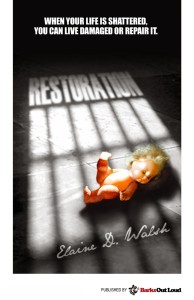Restoration
Elaine Walsh
Print Length: 333 pages
Page Numbers Source ISBN: 0985566337
Publisher: Barks Out Loud (September 15, 2013)
Sold by: Amazon Digital Services, Inc.
Language: English
ASIN: B00F82A59G
The tagline for this book reads: “When your life is shattered you can live damaged or choose to repair it.” That is a fitting tagline, and the story tells how Tess Olsen chooses to repair hers, which was broken when her mother abandoned the family to marry a convicted killer. The author made a clever choice in giving Tess a job as an art restorer. There is a parallel between the meticulous care that has to be taken in restoring great works of art and the care it takes to put one’s life on the right path.
Tess believes that the execution of Randall Wright will erase him and his influence from her life and then everything will be okay. It is in her reluctant sharing of feelings with Francesca, a co-worker, and Ben, the man she could love if she would allow, that she realizes it is not that simple. She is the one who has to wipe Randall Wright from her life, not the justice system or anyone else.
When the story opens, Tess is working in New York and has just met Ben. She has avoided any contact with her mother and is alarmed when her mother calls. At first the reader does not know why. And Tess’s fear of Wright seems a bit off to me. Why is she so afraid of him? That question is answered later in the story, but I would have liked some hint of what he had done to terrorize her a bit earlier. I understood the emotional devastation of having her mother abandon her, but I didn’t know why she was hiding from her mother and Randall Wright. He was in prison so he couldn’t hurt her. That confusion was cleared up when I found out what he did to the artwork her mother made her create for him when Tess was much younger.
Because of her fear and her pain, Tess keeps herself emotionally detached from her co-workers and others she meets, and there is an emotional detachment to much of the narrative, reflecting that disconnect. Again a nice parallel in the writing; one that worked well on most levels, but I was hoping that when Tess was alone, thinking about all the trauma she had experienced, we might have been privy to whatever emotion she was feeling in private. Since readers and characters connect through emotions, that would have helped me care more about Tess. Not that I didn’t care. I just didn’t want her to be quite so distant.
Still, those minor issues I had were not significant enough to keep me from enjoying the book. There was much to like, including the supporting cast of characters who were all deftly presented. I particularly liked Francesca, Tess’s mentor at the studio. Francesca helps Tess sort out her feelings for Ben, the New York Times art critic, who challenges Tess to step into a real relationship. That prospect scares Tess, as she is more comfortable with men like Kenyon LeMere, an artist who is more interested in sex and isn’t afraid to show that preference to the world in his paintings. When Tess first meets him they parry about his rumored affairs and he says, “It’s true that I love what I paint, and sometimes I paint who I love.”
She counters, “Those with many partners love what they’re doing, not who they’re doing it with.”
That was an interesting observation on her part, since her relationships up to this point involved many partners with no emotional entanglements, but it was a sign that she was starting that emotional shift that needed to happen. The exchange is also an example of some of the terrific dialogue in the book. It was all so real and natural, I enjoyed listening to these people talk.
Overall this is a good read, and I was cheering Tess on as she restored herself.
~~~~~~~~~~~~~~
Elaine Walsh will be my guest on Wednesday with a post about a visit to McDonald’s. Please do come back and make her feel welcome. Maybe we can all get a McCoffee, but don’t tell the folks who own the local coffee shop. I do get my latte fix at their place most of the time. (smile)

